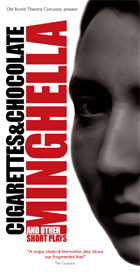I felt quite shaken when they announced that Anthony Minghella had died. I’m not sure why – I’d never met him, I knew some of his plays, I’d seen The English Patient which I remembered as long and too drawn out and I had enjoyed the epic journey of Cold Mountain. When I glanced back through some of his early plays it became clearer. There were words here that resonated, phrases and statements that seem deeper now. As I read more about him, I understand why he was such a highly respected talent, a man who could write, direct and could explain the art of creativity better than anyone. If you want to know more about writing and the craft of filmmaking I highly recommend Faber’s collection of interviews – ‘Minghella on Minghella’.
Two years on from his death, our company is about to embark on a performance of three of his best, but lesser known plays. The themes of love, passion, protest and miscommunication are just as relevant as when the plays were written in the 1980’s. The attraction for me is the range of the subject matter, the common hopes and disappointments of characters at different stages in their lives, and the chance to combine scenes, monologues and dance in particular, in one sitting. His witty, naturalistic dialogue is a pig for actors to learn but with careful attention, it should be captivating to perform. The real challenge will be to find the action in the text, much of which represent thoughts, stories and conversations which say one thing but mean completely the opposite. And for us to find the rich quality of the silences.
Of course the Studio will assist in this. The limitation of space is also the impetus for intimacy in performance, simple but effective staging and detailed use of sound; in this case Bach’s Mathew Passion (explicit in the script), location effects and the cadence of Minghella’s natural currency – his words.
We’ve had a couple of rehearsals to root out the mood and ideas of each play. Actors were on their feet and exploring their characters’ walks and gestures before the Christmas break. It always helps to find the rhythm of your part before you memorise the lines and movement is the best place to start. We’ve planned the set and have basic lighting and sound ideas in place. We’ll kick off the New Year with a read through, an opportunity to step back and listen to the words without worrying about when to move or which line comes next. I’m lucky to have the support of a voice coach, Susan Stern, who will help give focus to the sound and meaning of the play. And I’ve invited someone who interviewed Minghella and has studied his adaptations. In my experience, the more you know about the author, the quicker it is to reach the heart of their work.
Paul Osborne
Filed under: Cigarettes & Chocolate | Tagged: Anthony Mingella, Cold Mountain, English Patient, Old Bomb Theatre Company, Paul Osborne | 2 Comments »


